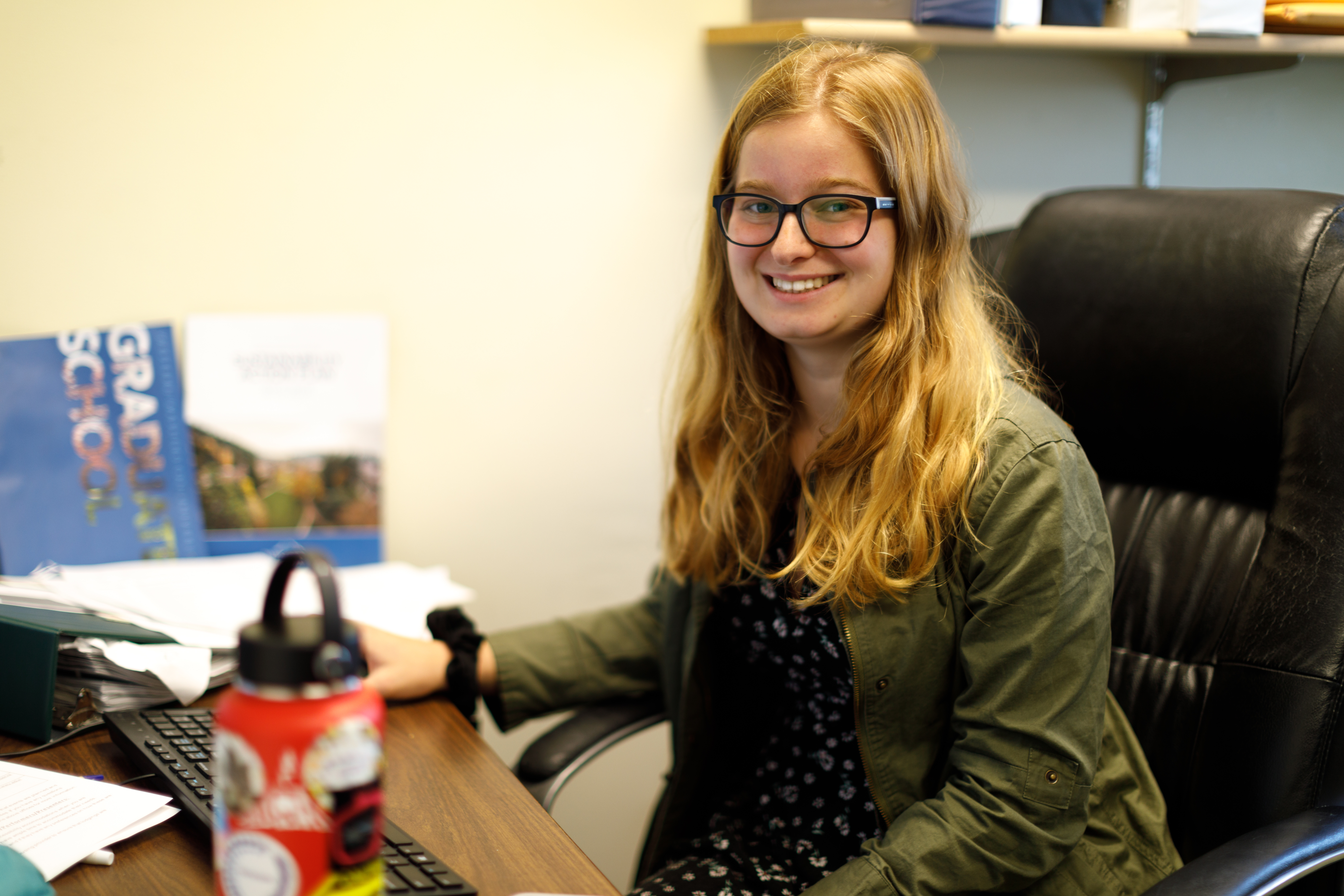AS Senate Pro-Tempore Adah Barenburg (she/her/hers) working in the office of the AS Board of Directors. Joe Addison//ASReview
BY JACK TAYLOR
A new school year means a new Associated Students Student Senate election will take place. Created last year, the term of the senators will last from winter quarter until the end of spring quarter. During fall quarter, Western students have the opportunity to run for and elect students for the senate.
Starting Sept. 25 to Oct. 11, students interested in running have the chance to acquire enough signatures to qualify for the general election. Students need at least 50 signatures as well as having declared their major in the college they intend to represent.
From there, campaigning goes until Oct. 25. The official voting week lasts from Oct. 28 to Nov. 1. The elected senate then commences in winter quarter.
Adah Barenburg, the new senate pro-tempore and former senator at-large, spoke about the upcoming election in addition to the in-and-outs of the new senate.
“I want to make sure that there is as many diverse perspectives and backgrounds that come into the election,” Barenburg said. “So trying to get as many people to run for the senate as possible so that the student body has a lot of choices to make.”
As for the voting process, students who are undeclared vote for the at-large senators, while students who are declared vote for candidates in their college in addition to at-large candidates. Any student who is double majoring can only vote in one of their colleges.
Because of the timeline and the structure the senate, former senators received no training according to Barenburg. Making sure the new senators have training before taking office is the next goal on her agenda.
“My goal up until December is to increase training, make sure [senators] feel comfortable in the roles before sitting on committees and making sure that their committee standing is more lasting,” Barenburg said.
Barenburg also spoke about the differences between the Associated Students Board of Directors and the senate, a common topic of confusion among students.
“The main difference that you can see is that the AS board is supposed to be more external in focus and the senate is supposed to be more internal,” Barenburg said.
Barenburg explained how the senate deals with university committees while the board deals with local politics.
The relationship between the board and the senate is expected to be supportive but limited according to Barenburg who will act as the gatekeeper between the two bodies of government.
“I hope the relationship is that both bodies of student government support one another, but that we don’t overlap and that we both don’t influence each other to a large extent because we are supposed to be separate bodies representing separate issues,” Barenburg said.
AS President Lani Defiesta also expressed excitement over working alongside the senate come winter quarter and believes having a good relationship will be vital.
“Two things that I can think of that I am excited to cultivate are communication between us as separate boards,” Defiesta said. “And in the near future, we want the senate pro-tempore and the senate board to be held up to as high of a standard as the executive board is.”
Outside of maintaining a healthy relationship with the executive board, Barenburg aims to eliminate any overlap between the two bodies. Last year both boards often delegated on the same issue which took up time.
“I think we could’ve used time better but because it was such a new body, we weren’t really sure what was happening,” Barenburg said. “I think we should’ve received training because there was a lot of just jumping straight in and not knowing how to navigate it.”
Paden Kolistka, a former senator for the College of Fine and Performing Arts, also spoke about what he thought the senate could improve upon in an email interview.
“One thing that the senate could improve on is representing every student group on campus,” Kolistka said. “I feel we often get caught in this bubble that everyone here thinks like us and has the same beliefs as us, but Western is far more diverse than we think.”
Kolistka also gave advice for anyone interested in running for senate.
“I found the student senate constantly challenging me to find my passions to fight for something I believe in,” he said. “Also, being aware of the diverse communities within your college and on campus is super important. You learn so much about the underlying problems on campus if you just talk to different groups of people.”
Barenburg stated how her experience on the senate illuminated her to how active students are on campus.
“My takeaway was that there is a lot of passionate students on this campus and its important that we are able to pay them for that labor and that the senate is a great avenue for that,” Barenburg said.
He also mentioned the importance of getting involved in student government.
“It is probably one of the most critical things a person can do,” he said. “Everyone has an opinion, but not everyone makes an effort to make that opinion heard when it comes to involvement in politics and student government, so I discovered there are needs for a lot of changes, but if there isn’t enough students who care then the larger power structures at the university won’t listen.”
More information on the student senate can be found on the AS website.

